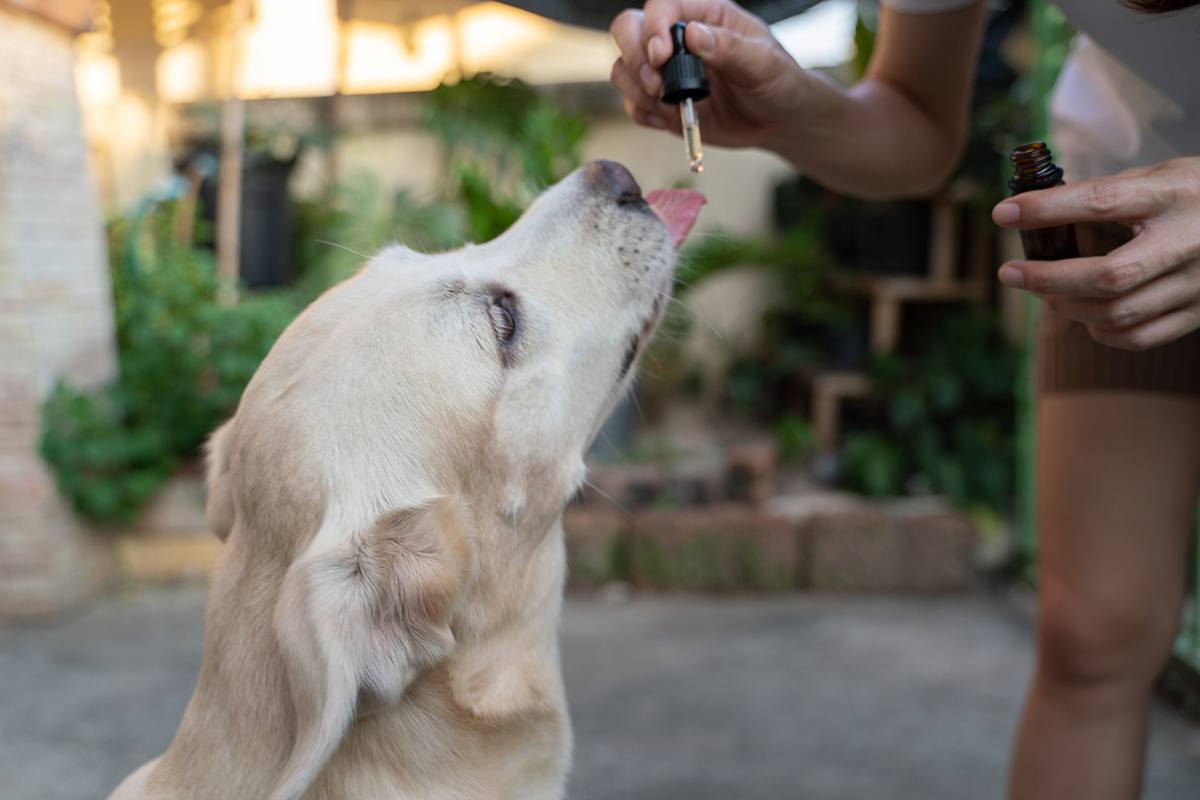Cannabidiol, or CBD, has become popular in recent years thanks to the marketing of its potential health benefits. So it’s no surprise that pet owners are turning to CBD as a remedy for various ailments in their furry companions.
Yet because there is little evidence on the effectiveness and safety of CBD in animals, Dr. Amy Savarino, chief pharmacist for the Veterinary Medical Teaching Hospital at the Texas A&M School of Veterinary Medicine and Biomedical Sciences, explains how owners can evaluate CBD products for their pets to ensure they are choosing a safe and effective product.
“A” Is For Advertising, “B” Is For Buyer Beware
CBD is a non-psychoactive extract from hemp plants, meaning it does not produce the “high” typically associated with cannabis use, unlike tetrahydrocannabinol (THC), a compound found in cannabis that is psychoactive or “high” producing. Instead, hemp-derived CBD is believed to regulate various physiological processes in the body and is sold in various forms, including oils, treats and capsules.
“Marketed CBD products advertise very lucrative benefits, claiming to calm your pets’ anxieties, reduce seizures, improve their skin ailments and relieve their pain and joint discomforts,” Savarino said. “We all want the best for our animals, so it seems natural to add a CBD product to a pet’s daily drug regimen if they are experiencing these health problems.”
Owners should take into consideration, however, state laws regarding CBD use before incorporating it into their pet’s routine. In states like Texas, for example, hemp-derived CBD products for humans have only recently become legal because it contains less than 0.3% of THC, while marijuana-derived CBD remains illegal due to its higher THC concentration.
“Because of differing laws and the lack of clarity in the laws for CBD in animal products, CBD reactions are still very unknown in animal patients,” Savarino said. “Veterinarians can certainly suggest that a patient receives CBD, but we need more research on these products to make better clinical decisions.”
Additionally, because CBD products are sold as over-the-counter supplements, there is no federal regulation to guarantee the percentage of active ingredients in the products.
“Often nutraceutical products — any product derived from food sources with extra health benefits — add other ingredients to their blends to make the product work better to give you the desired outcome,” Savarino explained. “Yet one study recently found that out of 29 marketed CBD products for pets, four had heavy metal products in them and only 10 had within 10% of their label claim of active ingredient in the product.”
In this case, Savarino strongly emphasizes that owners should carefully research and choose reputable brands when selecting CBD products for their pets, as reputable products are more likely to be labeled accurately.
“C” Is For Certificate Of Analysis, Communication
Savarino also suggests owners ask a product’s supplier or manufacturer for a COA, or certificate of analysis, because having a COA that is up to date with the product’s manufacturing date ensures that the ingredient information accurately reflects the product’s current quality and composition. Most reputable companies will provide COAs upon request.
“A COA is like a birth certificate for your product,” Savarino said. “You want to be sure that the COA is current with the product you are selecting because, for example, a COA from 1984 isn’t very accurate for a product on the shelf today.”
Even though owners are responsible for researching and selecting CBD products, it is essential to openly communicate with their veterinarian regarding CBD administration to their pets, ensuring its safe and effective use.
“CBD, unfortunately, has demonstrated potential drug interactions with other medications that a pet might be taking, so you should first discuss what product you are going to give with your veterinarian to confirm that all of the medications are safe to give concurrently,” Savarino said. “If your pet does start taking CBD, you should only provide the product as directed on the package and call your veterinarian immediately if you notice an increase in sleepiness, impaired coordination or unusual behavior after providing your pet with CBD.”
As CBD products gain popularity for their potential benefits in pets, it’s important for owners to tread carefully. The limited medical information available means that pet owners should approach such products with caution to ensure the safety and well-being of their furry friend.
Owners should take into consideration state laws regarding CBD use before incorporating it into their pet’s routine. Read More


